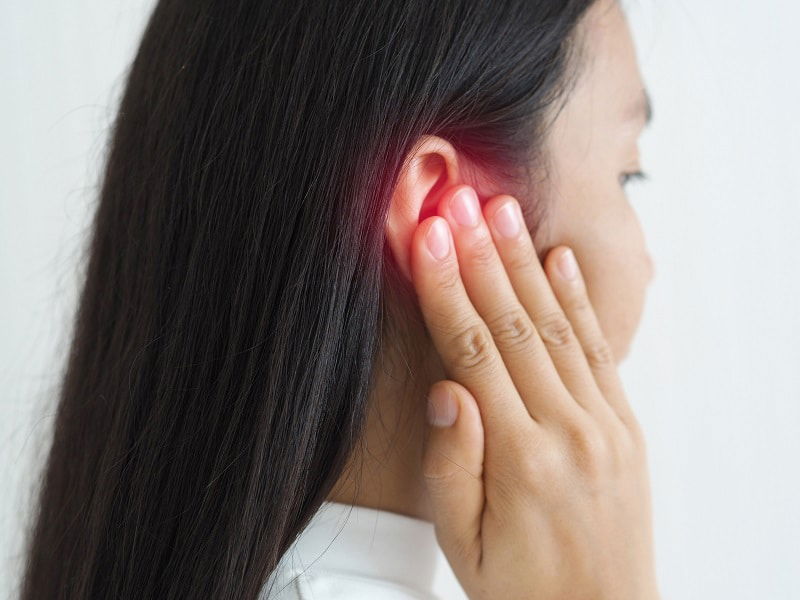Have you ever heard the term, “nothing but crickets”? It’s usually mentioned after someone tells a particularly bad joke, referencing that awkward pause where nobody makes a sound. For some tinnitus sufferers, it can have a more literal meaning.
Tinnitus is a condition that causes a ringing or buzzing sound in the ears. This sensation of noise is usually not heard by others, for most it’s more of an inkling that they’re hearing a sound. What they hear can vary from patient to patient but may resemble ringing, buzzing, or one of the following:
- Clicking
- Hissing
- Insect chirping (much like crickets)
- Whistling
- Whooshing
- Sometimes described as music
There are over 50 million Americans with this condition which is about 15 percent of the general public. Approximately 20 million of them are dealing with irritating, chronic tinnitus, but about two million suffer from extreme cases causing debilitating symptoms.
Patients present with different symptoms, some experiencing the noise on a constant basis, others reporting it comes at intervals. Some even state that it’s noticeable in time with their heart beating. It’s different for each individual.
This condition has no specific cause, with some cases brought on by exposure to noise, middle ear problems, hearing loss, injury, medications, and even wax buildup. Considered by the medical community as both audiological and neurological, this condition currently has no cure.
Tinnitus can be responsible for many changes in your health such as anxiety, depression, fatigue, headaches and trouble sleeping to name just a few. It can affect your earning potential if you’re unable to do your job due to the often irritating and sometimes painful symptoms.
While there are no cures, there are ways to help treat the condition as well as to lower your risk of developing tinnitus. By following these helpful steps, you can work to minimize the chances and maximize your quality of life.
Protect your hearing at all possible opportunities. Even simple, everyday noises like the lawnmower or blender running can cause damage to the tiny hair cells that help transmit sounds through the ear. This can be as detrimental over time as a sudden blast from a nearby ambulance or the long-term noise exposure many factory workers are exposed to.
Turn down the volume of your music and television. Be sure to use earplugs or earmuffs when taking part in louder activities like visiting the shooting range, sporting events, or even using power tools. By remembering these easy to use items, you can mitigate the effects of regular, daily sounds and reduce the risk of developing tinnitus.
Be sure to take medications as directed, don’t miss a dose then double up, especially with non-steroidal anti-inflammatory drugs (NSAIDS). Aspirin, ibuprofen, and naproxen have all been proven contributors to hearing loss. Antibiotics and antidepressants taken in high doses, as well as other drugs, can cause ototoxic reactions, resulting in tinnitus or even hearing loss. By observing the recommended dosages you can help reduce the risk of either occurring.
Don’t use cotton swabs. These tend to get stuffed too far into the ear canal, causing damage to the eardrum. It can also lead to a buildup of ear wax. Wax is the body’s way of self-cleaning the ear ducts and is completely normal. By using swabs (or keys, bobby pins, and even your finger) to remove it, you’re disturbing the natural process. If you do have waxy buildup, talk to your hearing health professional about solutions to dissolve or remove it.
Stay healthy by moving and eating right. Regular exercise gets the blood moving through your body, ensuring that your auditory system is consistently getting a fresh supply. The cochlea is fed by tiny capillaries which can be damaged by even a small amount of change in blood flow.
Your body needs plenty of vitamins and nutrients to supply your hearing system for optimal hearing health. A rainbow variety of different colored foods at each meal will help ensure you’re getting all the vitamins A, C, and E you need. It will also supply omega-3 fatty acids and magnesium your body requires for hearing functions.
Getting enough sleep is incredibly important. Tinnitus has been linked to fatigue, which can be observed by sufferers towards the end of a long day. The more tired you are, the more likely it is for tinnitus to be noticeable, possibly so much so that you’re unable to sleep from the noise. This is a vicious circle as a lack of sleep leads to tinnitus symptoms, which can then keep you from sleeping and that will only make the symptoms worsen. Getting between seven and nine hours of sleep each night can help reduce the chances of this condition.
By reducing stress and anxiety through scheduled breaks and relaxation techniques, as well as mindful meditation and breathing, you can work to lower the risk of tinnitus. Many people find that stressful situations bring on an increase of symptoms, yet when away on vacation they aren’t as noticeable.
Give your ears a break if you are exposed to loud noises for an extended period of time, such as at work, a night out on the town or at a restaurant. Research shows that after spending time in a loud environment, your ears need around 16 hours of quiet time for recovery. By regularly giving yourself time to recover throughout extended exposure, even if it’s just a five-minute break outside or sneaking off to a quiet room, you can help minimize the stress and exhaustion your auditory system is dealing with.
See your hearing health professional regularly for checkups. They are able to do testing that will help establish a baseline on your hearing abilities. If there are changes, they will be able to track them, help find the cause, and potentially treat the situation. If you or a loved one are having difficulty with tinnitus symptoms, be sure to call your hearing health professional soon to set up an appointment.




